(2 Kings 1:9-12) Didn’t God Send Fire Down From Heaven and Consume the Soldiers at the Command of Elijah?
“Then the king (Ahaziah) sent to him (Elijah) a captain of fifty with his fifty men. So he went up to him; and there he (Elijah) was, sitting on the top of a hill. And he spoke to him: ‘Man of God, the king has said, ‘Come down!’ So Elijah answered and said to the captain of fifty, ‘If I am a man of God, then let fire come down from heaven and consume you and your fifty men.’ And fire came down from heaven and consumed him and his fifty. Then he sent to him another captain of fifty with his fifty men. And he answered and said to him: 'Man of God, thus has the king said, Come down quickly!' So Elijah answered and said to them, 'If I am a man of God, let fire come down from heaven and consume you and your fifty men.' And the fire of God came down from heaven and consumed him and his fifty.” (2 Kings 1:9-12)
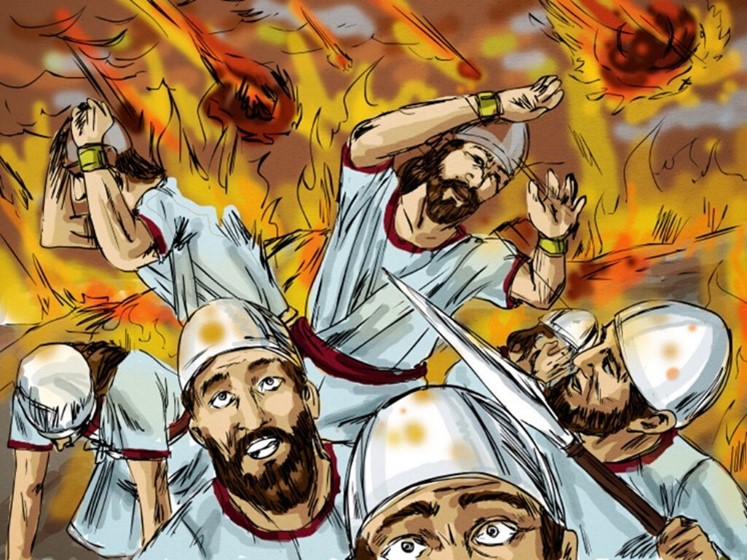 Is this incident proof that God will directly kill those who seek to harm His prophets? To understand this story properly let’s fast forward 700 hundred years and see what the Master teacher had to say concerning Elijah and the calling down of fire to consume enemies.
Is this incident proof that God will directly kill those who seek to harm His prophets? To understand this story properly let’s fast forward 700 hundred years and see what the Master teacher had to say concerning Elijah and the calling down of fire to consume enemies.
What Did Jesus Say?
In their connection with Jesus the disciples came to love Him. Every day they saw His compassion and love for the people and heard the wonderful things He shared about His Father. One day after a long period of labor Jesus sent His disciples into a Samaritan village to seek lodging for the night.
“And it came to pass, when the time was come that He should be received up, He stedfastly set His face to go to Jerusalem, And sent messengers before His face: and they went, and entered into a village of the Samaritans, to make ready for Him. And they did not receive Him, because His face was as though He would go to Jerusalem.” (Luke 9:51-53)
When the disciples saw how the Samaritans treated their Master they were indignant at their lack of hospitality. In the heat of their emotion they revealed the depth of the darkness that exists in human hearts:
“And when His disciples James and John saw this, they said, Lord, wilt thou that we command fire to come down from heaven, and consume them, even as Elijah did?” (Luke 9:54)
It would appear they had Biblical justification for their murderous plan to burn up the Samaritans. They mentioned the story of Elijah who had called down fire from heaven on some who had determined to harm him. Armed with this story the disciples felt fully justified in calling for the death of these ungrateful Samaritans. The answer Jesus gave however would have come as quite a shock:
“But He turned, and rebuked them, and said, Ye know not what manner of spirit ye are of. For the Son of man (the Messiah) is not come to destroy men's lives, but to save them. And they went to another village." (Luke 9:55, 56)
These words reveal the heart of the mission and character of Jesus. Jesus is not a destroyer but rather the Savior. At the same time it would appear that Christ not only rebuked the disciples but also the actions of Elijah. A surface reading of these two incidents would seem to indicate that although Jesus came to the earth to save men’s lives, God in the Old Testament was very willing to burn men alive for daring to capture His prophet. Did Jesus only rebuke the hatred of the disciples for wanting to destroy the Samaritans or was Jesus also rebuking the actions of Elijah as well? The answer Jesus gives to the disciples concerning His mission would indicate that the rebuke was also for Elijah. How could Jesus rebuke the disciples saying that His mission was to save men and then explain that in certain instances He would destroy men? If this were the case, Jesus would have told them that now is not the time for these things or that we should pray for them a little longer first. Jesus gives no indication of delayed retribution. He only speaks of saving people’s lives as opposed to destroying them.
This statement by Jesus in the King James Version appears to be quite an embarrassment for many of the modern translations of the Bible because these words are simply not there:
New International Version: “But Jesus turned and rebuked them. Then He and His disciples went to another village.” (Luke 9:55, 56)
Revised Version: “But He turned, and rebuked them. And they went to another village.” (Luke 9:55, 56)
Having this omission within these various translations has tremendous ramifications for understanding the character of God.
God Is Not in the Fire
We now need to rewind a little in the story of Elijah. Many of you probably remember Elijah’s victory over the prophets of Baal upon Mt Carmel when God sent fire down to consume the sacrifice, revealing that He is the true God and Baal was a false god who could not consume the sacrifice because he does not exist. You can read that in 1 Kings Chapter 18. After this, God showed Elijah something extremely important that helps us with our main question:
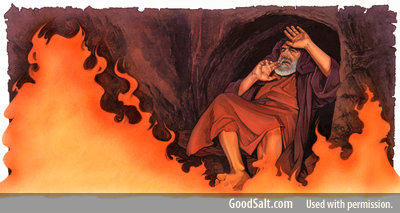 “And He (God) said, Go forth, and stand upon the mount before the LORD. And, behold, the LORD passed by, and a great and strong wind rent the mountains, and brake in pieces the rocks before the LORD; but the LORD was not in the wind: and after the wind an earthquake; but the LORD was not in the earthquake: and after the earthquake a fire; but the LORD was not in the fire: and after the fire a still small voice.” (1 Kings 19:11, 12)
“And He (God) said, Go forth, and stand upon the mount before the LORD. And, behold, the LORD passed by, and a great and strong wind rent the mountains, and brake in pieces the rocks before the LORD; but the LORD was not in the wind: and after the wind an earthquake; but the LORD was not in the earthquake: and after the earthquake a fire; but the LORD was not in the fire: and after the fire a still small voice.” (1 Kings 19:11, 12)
What was the point that God wanted to make to Elijah? The same principle expressed elsewhere in Scripture:
“This is the word of the LORD unto Zerubbabel, saying, Not by might, nor by power, but by My spirit, saith the LORD of hosts.” (Zechariah 4:6)
God was telling Elijah that He does not use force to compel men to obey and advance His kingdom but rather it is His still small voice that works in the hearts of men to turn them towards truth. It is contradictory for God to tell Elijah He is not in the fire and then turn around and burn up 102 men for seeking to capture Elijah. It was 102 men because the fire came down twice on two sets of 50 men and their leaders. It is true that God sent a fire to consume the sacrifice upon the altar upon Mt Carmel but this fire was not sent to destroy men’s lives but to save them. We see this in the reaction of the people:
“And when all the people saw it, they fell on their faces: and they said, The LORD, He is the God; the LORD, He is the God.” (1 Kings 18:39)
Later, when Elijah called fire to come down from heaven on the king’s soldiers, he had already been shown that God was not in a fire to compel or force men to comply. The groveling submission of the third captain of 50 men was not the submission God was seeking.
“And again he (Ahaziah) sent the captain of a third fifty with his fifty. And the third captain of fifty went up, and came and fell on his knees before Elijah, and besought him, and said unto him, O man of God, I pray thee, let my life, and the life of these fifty thy servants, be precious in thy sight.” (2 Kings 1:13)
Did this man kneel in reverence before the God of Elijah because he loved Him and wanted to worship? Certainly not! He was terrified that he was going to die and was begging for his life. If this type of worship was acceptable to God then Jesus could have called down fire on a few Pharisees and a few Romans, and everyone would have been worshipping Him instantly – not out of love for Him, but rather through fear. Therefore it was not God who was in that fire that consumed those men. “God is love” and “there is no fear in love; but perfect love casteth out fear: because fear hath torment. He that feareth is not made perfect in love. We love Him, because He first loved us” (1 John 4:8, 18, 19).
Elijah’s Motivation and Confession
How then do we account for what happened there? Let’s consider the context:
“And Ahaziah fell down through a lattice in his upper chamber that was in Samaria, and was sick: and he sent messengers, and said unto them, Go, inquire of Baalzebub the god of Ekron whether I shall recover of this disease.” (2 Kings 1:2)
The captain and his men were under the authority of the king of Israel (Ahaziah) who had sent for help from Baalzebub (also spelled Beelzebub), the god of Ekron. The god of Ekron was a false god inspired by Satan. In seeking help from this god, he was opening himself up to the jurisdiction of Satan.
“Know ye not, that to whom ye present yourselves as servants unto obedience, his servants ye are whom ye obey; whether of sin unto death, or of obedience unto righteousness?” (Romans 6:16)
Even though these men representing king Ahaziah had placed themselves under the jurisdiction of Satan, they still recognized Elijah as a "man of God." All Israel remembered what had happened at Mt Carmel when they saw that God was with Elijah. If they believed Elijah was a man of God, why did Elijah seek a sign to validate it by saying, “If I be a man of God, let fire come down from heaven, and consume thee and thy fifty” (2 Kings 1:10, 12)? We discover the answer a little later in the chapter:
“And the angel of the LORD said unto Elijah, Go down with him: be not afraid of him. And he arose, and went down with him unto the king.” (2 Kings 1:15)
Elijah was told not to be afraid. Why was Elijah afraid? The problem stems back to just after the events of Mt Carmel:
“And Elijah said unto them [those who had confessed that God is the only God], Take the prophets of Baal; let not one of them escape. And they took them: and Elijah brought them down to the brook Kishon, and slew them there.” (1 Kings 18:40)
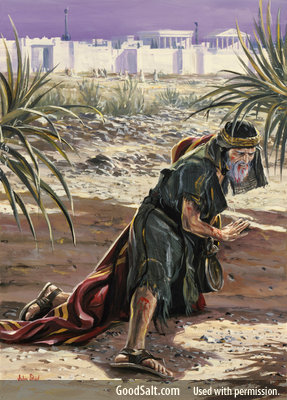 Before Elijah slew the prophets of Baal he had stood fearlessly before the king and all his men. Previous to this, Elijah had been hunted for over three years after fearlessly going in before the king to tell him there would be no rain. There is no mention that Elijah was afraid through all of these experiences. It was only after Elijah had killed all the prophets of Baal with the sword that he became afraid.
Before Elijah slew the prophets of Baal he had stood fearlessly before the king and all his men. Previous to this, Elijah had been hunted for over three years after fearlessly going in before the king to tell him there would be no rain. There is no mention that Elijah was afraid through all of these experiences. It was only after Elijah had killed all the prophets of Baal with the sword that he became afraid.
“And Ahab told Jezebel all that Elijah had done, and withal how he had slain all the prophets with the sword. Then Jezebel sent a messenger unto Elijah, saying, So let the gods do to me, and more also, if I make not thy life as the life of one of them by tomorrow about this time. And when he saw that, he arose, and went for his life, and came to Beersheba, which belongeth to Judah, and left his servant there.” (1 Kings 19:2, 3)
It would appear that there is a reverse principle related to the golden rule and it goes like this: “What wrong things you do to others you will fear they will be done to you.” This was certainly the experience of Cain:
“And Cain said unto the LORD, My punishment is greater than I can bear. Behold, thou hast driven me out this day from the face of the ground; and from thy face shall I be hid; and I shall be a fugitive and a wanderer in the earth; and it shall come to pass, that whosoever findeth me shall slay me.” (Genesis 4:13, 14)
After Elijah had escaped the hands of the wicked Jezebel, he said something strange:
 “But he himself went a day’s journey into the wilderness, and came and sat down under a juniper tree: and he requested for himself that he might die; and said, It is enough; now, O LORD, take away my life; for I am not better than my fathers.” (1 Kings 19:4)
“But he himself went a day’s journey into the wilderness, and came and sat down under a juniper tree: and he requested for himself that he might die; and said, It is enough; now, O LORD, take away my life; for I am not better than my fathers.” (1 Kings 19:4)
Elijah ran for his life but then asks God to take away his life. Why not just let Jezebel kill him? Then he adds the mournful words “for I am no better than my fathers.” What did he mean by this? His confession to God a little later on reveals the motive:
“And he came thither unto a cave, and lodged there; and, behold, the word of the LORD came to him, and he said unto him, What doest thou here, Elijah? And he said, I have been very jealous for the LORD, the God of hosts; for the children of Israel have forsaken thy covenant, thrown down thine altars, and slain thy prophets with the sword: and I, even I only, am left; and they seek my life, to take it away.” (1 Kings 19:9-10)
First, Elijah pours out to God his disappointment and frustration at the failures of Israel, and the murder of the prophets of God with the sword. Elijah had hoped the nation would rally to his side and assist him in reforming the kingdom. When Jezebel threatened him, he had hoped that everyone would stand with him to defeat her purpose but he was left alone. It seemed everything was in vain.
Second, his motivation for the killing of the prophets of Baal is revealed. They had killed the prophets of God with the sword. The punishment for idolatry given in the Law of Moses was death by stoning, not killing them with the sword according to Deuteronomy 17:2-7; and the verses which come after explain how this investigation and sentence is to be properly carried out. But there is also a very specific reason why God commanded such a horrible death sentence as stoning which you can read about in the article entitled: Why Did God Command the Horrific Death Sentence of Stoning?
As we learn from the story of Saul and the Amalekites, God reveals what is in the heart of the sinful one He is speaking to. When acted upon, God "visits the iniquity of the fathers upon the children unto the third and fourth generation” (Exodus 20:5) which means He allows a chain of circumstances to play out which will eventually result in sin punishing sin. See the article, Why Would a God of Love Command King Saul to Kill Men, Women and Babies?
The point is that Elijah did not follow the process outlined in the Scriptures for dealing with idolatry. This reveals that although Elijah desired to honor the true God, he went about it the wrong way. This connects us back to the story of the disciples. They loved and honored their master, but their love was subverted by Satan when things did not go as they wished and the spirit of revenge was revealed. Therefore it was fitting that the disciples in their spirit connect to the story of Elijah because it reflected a similar spirit. We are reminded that:
“Elijah was a man with a nature like ours…” (James 5:17 (New King James Version)
Elijah knew that the prophets of Baal were worthy of death. On one hand they had refused to repent and they rejected the only Source of life and thus God respected their decision of self-destruction. On the other hand, Elijah’s manner of dealing with this matter caused him to move in a way that was not in God’s order. His sinful desires of revenge punished the sinful prophets of Baal. This is complicated more by the fact that Elijah did it ignorantly. He exercised much faith thinking it was God’s will. He acted like those whom Jesus warns His disciples about:
“I have said all these things to you to keep you from falling away. They will put you out of the synagogues. Indeed, the hour is coming when whoever kills you will think he is offering service to God. And they will do these things because they have not known the Father, nor Me.” (John 16:1-3, English Standard Version)
So, God doesn’t blame or condemn Elijah (He never condemns anyone). Nevertheless, God let’s Elijah reap the consequences of his action in order to bring Elijah to repentance. This concept is echoed by Paul when he says, “to deliver such a one to Satan for the destruction of the flesh, that his spirit may be saved in the day of the Lord Jesus” (1 Corinthians 5:5). Like all of us, God was leading Elijah from the Old Covenant mindset of trying to do the works of God his own way and leading Him into the New Covenant mindset where we, like Abraham, finally submit ourselves and allow God to do that which He Himself has promised to do (Romans 4:18-22).
This is proven through his sudden fear of death which he had not experienced before. This fear was still with Elijah when he was approached by all the soldiers. As Elijah had killed with the sword, he feared that he would die by the sword. Notice that Jezebel would do to Elijah what Elijah did to the prophets, and the response of Elijah revealed his belief that “the avenger of blood” (mentioned in the Deuteronomy 19 and Joshua 20) is after him. Is this not the natural cause of what he did?
Another issue here is how the “heroes” of the Bible can be called righteous and be full of faith, but not necessarily sinless and having a perfect understanding of God’s character due to the limitations of environment, culture, knowledge, experience, maturity, etc. Paul says “and the times of this ignorance God winked at; but now commandeth all men everywhere to repent” since God’s true character has been revealed perfectly through His only begotten Son (Acts 17:30, 31). Jesus taught us that His Father loves His enemies and does good to those who hate Him because He is always “kind unto the unthankful and to the evil” (see Luke 6:27-36). For we know that “the path of the just is as the shining light, that shineth more and more unto the perfect day” (Proverbs 4:18).
God gave Elijah the opportunity to reflect, and used this man of faith as an object lesson to the rest of humanity, just like He did with Job. That that seems like a tough weight Job and Elijah bore, but such is the high calling of some.
Who Brought the Fire Down?
Although the captains had no doubt Elijah was a man of God, Elijah himself was wrestling with his fear of death and if he were still no better than his fathers. Satan capitalized on Elijah's doubt, prompting him to express it by saying:
“IF I be a man of God, let fire come down from heaven, and consume thee and thy fifty.” (2 Kings 1:10)
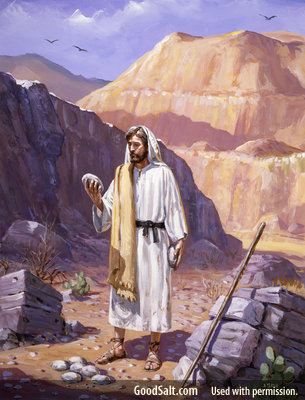 It is similar to these words uttered by Satan to Jesus:
It is similar to these words uttered by Satan to Jesus:
“IF thou be the Son of God, command that these stones be made bread.” (Matthew 4:3)
The use of divine power to reassure a person of their standing with God is a lack of faith. We are to believe by faith that we are children of God by what God has already told us. Forty days prior to Satan tempting Jesus to prove He was the Son of God by turning the stones into bread, Jesus had heard these words at His baptism:
“And lo a voice from heaven, saying, This is My beloved Son, in whom I am well pleased.” (Matthew 3:17)
Jesus did not need to prove this with the display of power – He believed it by faith! He believed the words His Father spoke, thus He told Satan, "It is written, Man shall not live by bread alone, but by every word that proceedeth out of the mouth of God" (Matthew 4:4). Elijah, however, revealed a lack of faith by calling down fire. How were the 50 men benefited by this display of power? How did this help them believe what they had already confessed about Elijah being a man of God? The one who was uncertain about this was Elijah. This uncertainty caused Elijah to forget that God was not in the fire, and he was overcome by Satan’s suggestion to call down fire on these men.
Do we have evidence that Satan can bring fire from heaven and burn people up? Yes, in the book of Job we read:
“And the LORD said unto Satan, Behold, all that he (Job) hath is in thy power; only upon himself put not forth thine hand. So Satan went forth from the presence of the LORD ... While he (Job) was yet speaking, there came also another, and said, The fire of God is fallen from heaven, and hath burned up the sheep, and the servants, and consumed them; and I only am escaped alone to tell thee.” (Job 1:12, 16)
Here we see that Satan is the one who brought down this fire from heaven, but the messenger mistakenly attributed it to God. Could not the same misunderstanding be experienced in the time of Elijah? In fact, this misunderstanding will be repeated spiritually just before Jesus’ second coming.
“And I (John) beheld another beast coming up out of the earth; and he had two horns like a lamb, and he spake as a dragon. And he exerciseth all the power of the first beast before him, and causeth the earth and them which dwell therein to worship the first beast, whose deadly wound was healed. And he doeth great wonders, so that he maketh fire come down from heaven on the earth in the sight of men, And deceiveth them that dwell on the earth by the means of those miracles which he had power to do in the sight of the beast …” (Revelation 13:11-14)
While during the time of Elijah they witnessed literal fire, we in the end times will witness a spiritual fire. This fire represents a display of power deceiving people to believe it is of God’s Holy Spirit, but will actually be “the spirits of devils, working miracles” (Revelation 16:14). Please see the Questions Concerning Bible Prophecy section for more info on this.
Remaining Questions
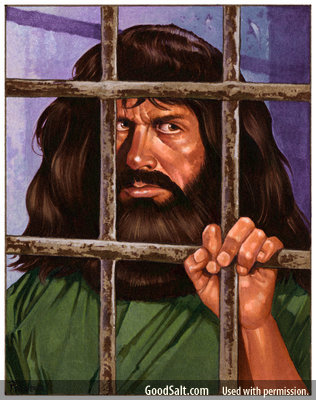 There are some questions that still remain. If Satan deceived Elijah through his self-doubt how could it be possible that in the very next chapter Elijah could be translated to heaven? It seems absurd to think that making such a big mistake near the end of his earthly life should be rewarded with a direct passage to heaven and eternal life. It becomes a little clearer as we consider John the Baptist and how he actually doubted that Jesus was the Messiah right before his death:
There are some questions that still remain. If Satan deceived Elijah through his self-doubt how could it be possible that in the very next chapter Elijah could be translated to heaven? It seems absurd to think that making such a big mistake near the end of his earthly life should be rewarded with a direct passage to heaven and eternal life. It becomes a little clearer as we consider John the Baptist and how he actually doubted that Jesus was the Messiah right before his death:
“Now when John had heard in the prison the works of Christ, he sent two of his disciples, And said unto Him, Art thou He that should come, or do we look for another?” (Matthew 11:2, 3)
Jesus responds to the disciples sent by John with these words:
“Jesus answered and said unto them, Go and show John again those things which ye do hear and see: The blind receive their sight, and the lame walk, the lepers are cleansed, and the deaf hear, the dead are raised up, and the poor have the gospel preached to them. And blessed is he, whosoever shall not be offended in Me.” (Matthew 11:4-6)
The Bible does not tell us how John responded, but by the way that Jesus spoke about John it seems evident that John overcame his doubts and was prepared for martyrdom. But what does this have to do with Elijah? Jesus continued:
“And if you are willing to receive it, he (John) is Elijah who is to come.” (Matthew 11:14)
Why did Jesus say John was Elijah who was to come? He’s referring to the prophecy of Malachi:
“Remember ye the Law of Moses My servant, which I commanded unto him in Horeb for all Israel, with the Statutes and Judgments. Behold, I will send you Elijah the prophet before the coming of the great and dreadful day of the LORD: And he shall turn the heart of the fathers to the children, and the heart of the children to their fathers, lest I come and smite the earth with a curse.” (Malachi 4:4-6)
This doesn’t mean that John the Baptist was literally Elijah reincarnated, but that he would come in the spirit and power of Elijah to prepare the way for the Messiah. Before John was born, the angel told his father Zechariah:
“And he (John) shall go before Him (Jesus/Messiah) in the spirit and power of Elijah, to turn the hearts of the fathers to the children, and the disobedient to the wisdom of the just; to make ready a people prepared for the Lord.” (Luke 1:17)
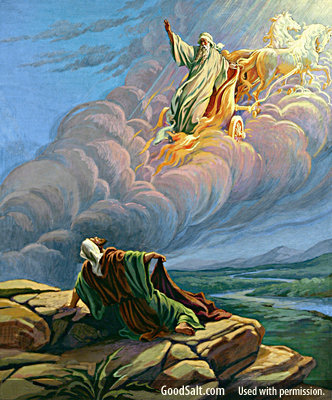 John the Baptist did a mighty work for God and then had a major crisis of faith which he overcame, resulting in him being prepared for death. This is in the same spirit as Elijah who did a great work for God and then had a major crisis of faith toward the end of his ministry. Elijah overcame his self-doubt that caused a fiery death for 102 men, and was translated. This is a precious lesson for all of us, that the just shall live by faith and not upon the merits of what they have done. The translation of Elijah after such a major failure gives all of us great hope that we also can be translated after seeing how weak and helpless we are. Let us rejoice that salvation is in the merits of Christ alone, not in the supposed works of superhero prophets who can destroy others in the name of God while defending themselves.
John the Baptist did a mighty work for God and then had a major crisis of faith which he overcame, resulting in him being prepared for death. This is in the same spirit as Elijah who did a great work for God and then had a major crisis of faith toward the end of his ministry. Elijah overcame his self-doubt that caused a fiery death for 102 men, and was translated. This is a precious lesson for all of us, that the just shall live by faith and not upon the merits of what they have done. The translation of Elijah after such a major failure gives all of us great hope that we also can be translated after seeing how weak and helpless we are. Let us rejoice that salvation is in the merits of Christ alone, not in the supposed works of superhero prophets who can destroy others in the name of God while defending themselves.
The other question that needs to be considered is why did God allow these men to be destroyed by Satan with fire? As these men were servants of the king of Israel who had given himself over to Baalzebub the god of Ekron, these men had no defense against the destroyer. As Satan was enabled to have access to these men, he needed to be able to kill them in a way that would indicate that God did it. It was almost the perfect deception; do the deed and convince the world that God did it. The fears of Elijah were exploited by Satan to give him the alibi that he needed. This plan has been very successful because most people believe that God burned up those men, but thankfully Jesus tells us that this is not His Spirit. He is the Savior and not the Destroyer (Luke 9:54-56).



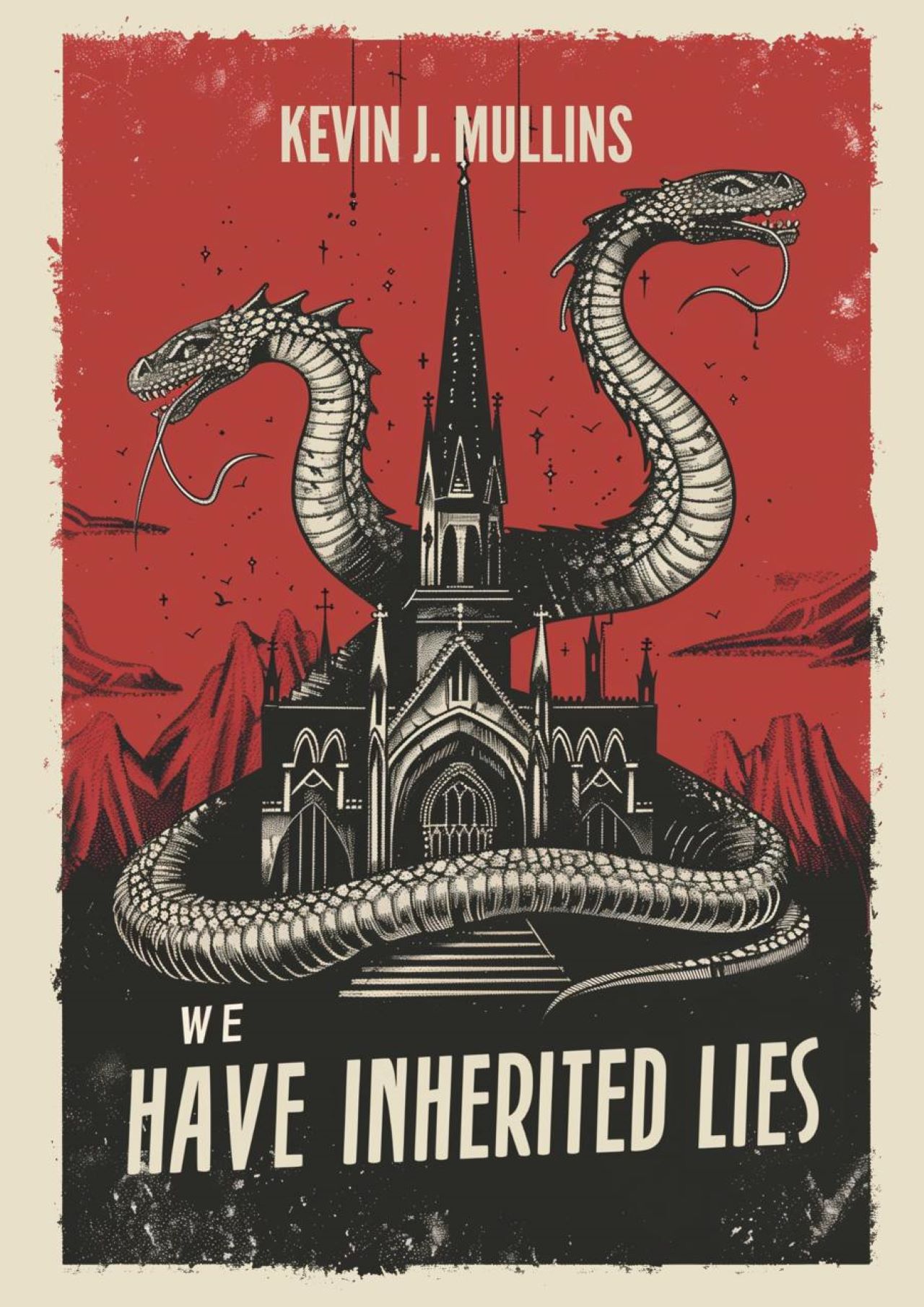
/Did_God_Kill_Jesus_(cover).jpg)

